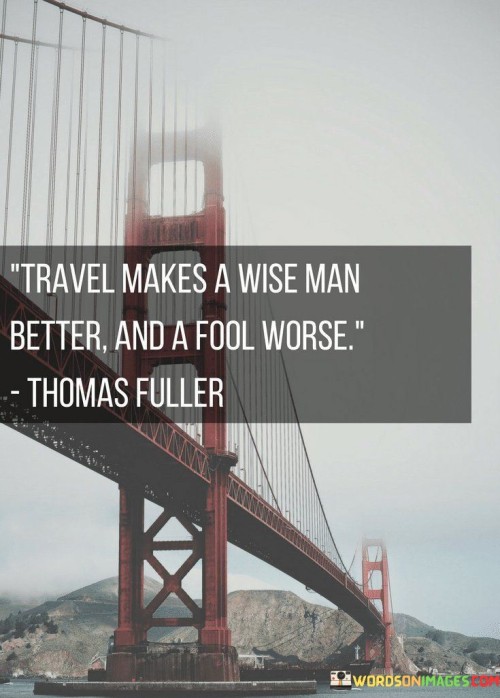The quote "Travel makes a wise man better, and a fool worse" conveys a profound message about the impact of travel on individuals based on their underlying traits and character. It suggests that travel has the power to enhance and enrich the experiences of a wise person, leading to personal growth, cultural understanding, and expanded perspectives. On the other hand, for a fool, travel may exacerbate negative traits and behaviors, potentially leading to ignorance, recklessness, or misadventure. This quote underscores the importance of self-awareness and mindfulness while traveling, as one's mindset and approach can significantly influence the outcomes and benefits of the journey. For a wise person, travel becomes a transformative and enlightening experience. Being open-minded and curious, a wise individual seeks to learn from different cultures, embrace diverse perspectives, and appreciate the beauty of the world. Travel exposes them to new ideas, traditions, and ways of life, fostering empathy and tolerance towards others. The wise person becomes more adaptable and flexible, navigating through unfamiliar environments with ease, and finding value in each encounter. As they gain insights from their experiences, the wise person returns home with a deeper understanding of the world, broadened horizons, and a heightened sense of wisdom. In contrast, travel can be a double-edged sword for a fool. Lacking the capacity for discernment and wisdom, a fool may approach travel with a careless and reckless attitude. They might disregard cultural sensitivities, engage in risky behaviors, or make unwise decisions without considering the consequences. Traveling without a sense of purpose or awareness, a fool may miss out on the opportunities for growth and learning, and instead, become more entrenched in their ignorance and arrogance. Their experiences may not lead to any positive transformation, and in the worst cases, they may find themselves in trouble or problematic situations. Ultimately, the quote serves as a cautionary reminder about the importance of self-awareness and personal growth in the context of travel. It encourages individuals to approach travel with mindfulness and humility, regardless of their intellectual capacity. A wise person uses travel as an opportunity for self-discovery, embracing the beauty of diversity and the wealth of knowledge that the world offers. They cultivate a sense of wonder and gratitude, finding value in every encounter and experience. Conversely, a fool risks worsening their foolish tendencies if they fail to approach travel with respect, openness, and an eagerness to learn. In conclusion, the quote "Travel makes a wise man better, and a fool worse" highlights the transformative power of travel on individuals based on their character and mindset. For the wise, travel becomes a path to personal growth, cultural understanding, and expanded perspectives. It enhances their wisdom and broadens their horizons. On the other hand, for a fool, travel may lead to negative outcomes if approached carelessly and without mindfulness. The quote serves as a reminder of the importance of self-awareness and the mindful pursuit of knowledge and experiences while traveling. By embracing travel with humility, curiosity, and an eagerness to learn, individuals can truly reap the benefits of the journey and become better versions of themselves.


